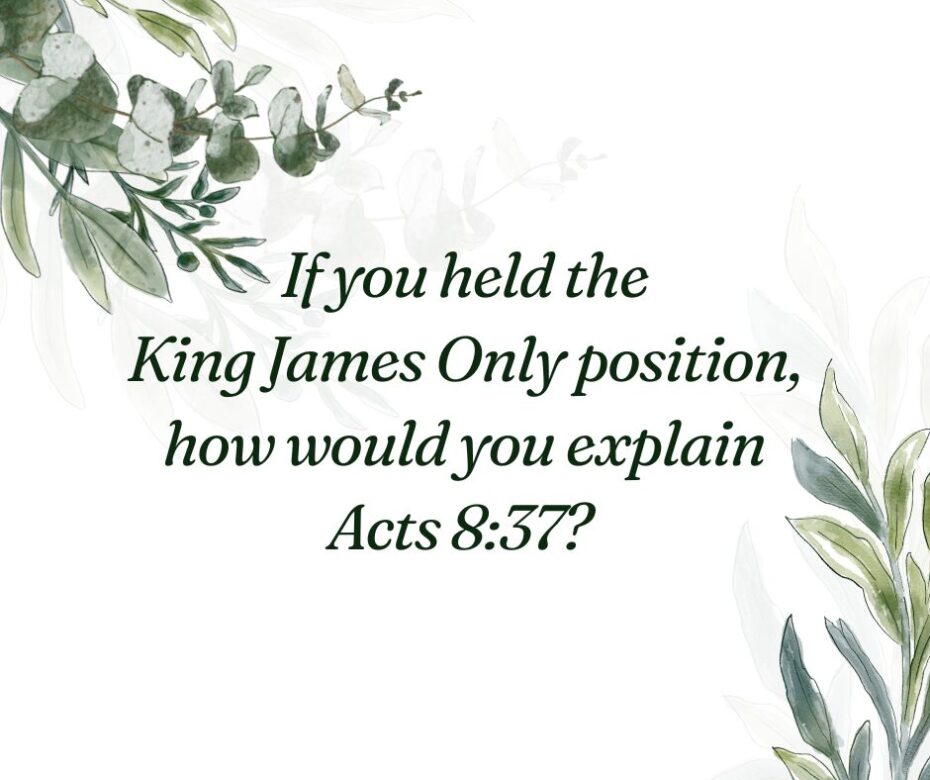WW asks an interesting question about saving faith:
LOVE your channel. QUESTION: Acts 8:37 says, “And Philip said, ‘If thou believest with all thine heart, thou mayest.’ And he answered and said, ‘I believe that Jesus Christ is the Son of God.’” Can a person be saved by belief, but maybe Not with All his heart? Is there mostly believe? How do you gauge “ALL”?
This is the only verse in the Bible that speaks of believing “with all your heart.”
In fact, no other verse in the Bible speaks of degrees of faith.i
However, there are three other verses in which the expression “with all your heart” occurs. The Lord said the greatest commandment is “You shall love the Lord your God with all your heart, with all your soul and with all your mind” (Matt 22:37; Mark 12:30; Luke 10:27). Those verses are sanctification verses. They do not state the condition for everlasting life.
Acts 8:37 is not found in the majority of Greek manuscripts. In fact, neither the Majority Text nor the so-called Critical Text includes this verse. It is found in only a few manuscripts. Unfortunately, the handful of manuscripts that Erasmus used to develop the Textus Receptus (TR) included this verse.
According to Metzger’s Textual Commentary on the Greek New Testament, “Although the passage does not appear in the late medieval manuscript on which Erasmus chiefly depended for his edition (ms. 2), it stands in the margin of another (ms. 4), from which he inserted it into his text because he ‘judged that it had been omitted by the carelessness of scribes” (pp. 315-16).
It is clear that this phrase is not Scripture. However, because some people believe that anything in the KJV is Scripture, I will make some additional comments.
First, the issue here is baptism, not regeneration. The Ethiopian Eunuch had already believed and been born again (Acts 8:34-36).
Second, the disputed text does not say that the man claimed to have some extraordinary belief. He simply replied, “I believe that Jesus Christ is the Son of God.” And then Philip baptized him. He did not quiz him on whether he believed with his whole heart.
Third, WW is correct: We either believe something or we do not.
Fourth, as I mentioned above, no other verse in the Bible distinguishes different degrees of faith.
Fifth, John’s Gospel, the only evangelistic book in the Bible (John 20:30-31), quotes the Lord Jesus repeatedly saying that whoever believes in Him has everlasting life and will never perish, die spiritually, or be cast out. He never indicated that it took some particular measure of faith to be born again.
Sixth, while there probably are some King James Only (KJO) advocates who cite this verse to prove that it takes some special kind of faith to be born again, I’m not aware of them. My guess is that most KJO people teach that “whosoever surely meaneth me.”ii I imagine they would agree with the five points I just made.
Whoever believes in the Lord Jesus Christ has everlasting life and will never perish (John 3:16; 5:24; 6:35, 37, 47; 11:25-27; 20:31; Acts 16:31; Eph 2:8-9). That’s good news.
Keep grace in focus.
__________
i I realize that Jesus sometimes spoke of “such great faith.” However, He was referring to someone’s believing something that is hard to believe and that few believe. He was not referring to some special kind of faith. For more details, see this article on the postmodern view of faith and this article on Jesus’ sayings about great faith.
ii This is the title of a famous hymn we used to sing at First Baptist Dallas in 1980 when I was an intern there in the high school department.


